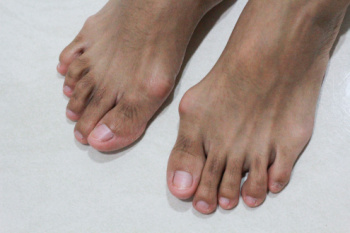
A bunion, or hallux valgus, occurs when the base joint of the big toe shifts outward, causing the tip of the toe to lean toward the smaller toes. While the exact cause is not fully understood, factors like wearing poorly fitting footwear, a family history of bunions, and joint conditions such as osteoarthritis or rheumatoid arthritis can contribute to their development. Symptoms of bunions include pain, stiffness, and swelling at the big toe joint, which can make walking and finding comfortable shoes difficult. Bunions usually worsen over time, making early treatment important. A podiatrist can evaluate the severity of the bunion and recommend appropriate footwear, prescribe custom orthotics or discuss surgical solutions. These treatments can help alleviate pain, improve foot function, and prevent the condition from worsening. If you have a bunion that is interfering with your daily activities, it is suggested that you schedule an appointment with a podiatrist for an exam and treatment options.
If you are suffering from bunion pain, contact Bryan Sullivan, DPM of Mississippi Foot Center . Our doctor can provide the care you need to keep you pain-free and on your feet.
What Is a Bunion?
Bunions are painful bony bumps that usually develop on the inside of the foot at the joint of the big toe. As the deformity increases over time, it may become painful to walk and wear shoes. Women are more likely to exacerbate existing bunions since they often wear tight, narrow shoes that shift their toes together. Bunion pain can be relieved by wearing wider shoes with enough room for the toes.
Causes
- Genetics – some people inherit feet that are more prone to bunion development
- Inflammatory Conditions - rheumatoid arthritis and polio may cause bunion development
Symptoms
- Redness and inflammation
- Pain and tenderness
- Callus or corns on the bump
- Restricted motion in the big toe
In order to diagnose your bunion, your podiatrist may ask about your medical history, symptoms, and general health. Your doctor might also order an x-ray to take a closer look at your feet. Nonsurgical treatment options include orthotics, padding, icing, changes in footwear, and medication. If nonsurgical treatments don’t alleviate your bunion pain, surgery may be necessary.
If you have any questions, please feel free to contact our office located in Jackson, MS . We offer the newest diagnostic and treatment technologies for all your foot care needs.
